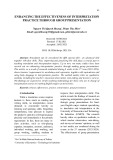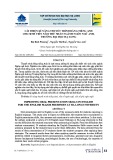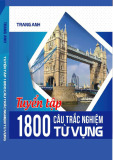
P.T.Thuy Tien, P.L Thu Thao / Tạp chí Khoa học và Công nghệ Đại học Duy Tân 05(66) (2024) 174-184
174
The situation of using ELSA Speak application by English majored
students - Duy Tan University and some suggestions
Thực trạng sử dụng phần mềm ELSA Speak của sinh viên chuyên ngành tiếng Anh -
Trường Đại học Duy Tân và một số đề xuất
Phan Thi Thuy Tiena*, Pham Ly Thu Thaoa
Phan Thị Thủy Tiêna*, Phạm Lý Thu Thảoa
aFaculty of English, School of Languages, Humanities and Social Sciences, Duy Tan University, Da Nang, 550000,
Vietnam
aKhoa Tiếng Anh, Trường Ngôn ngữ - Xã hội Nhân văn, Trường Ðại học Duy Tân, Ðà Nẵng, Việt Nam
(Date of receiving article: 28/03/2024, date of completion of review: 26/04/2024, date of acceptance for posting:
21/05/2024)
Abstract
The Faculty of English at School of Languages, Humanities and Social Sciences, Duy Tan University has implemented
an artificial intelligence-based application called ELSA Speak to assist students in improving their language skills,
particularly English pronunciation. However, as this is a new application, research on its effectiveness is limited. A survey
conducted with first-year English majored students at Duy Tan University revealed that ELSA Speak was generally
positively evaluated by most students and helped improve their pronunciation abilities. However, the research also
indicated that ELSA Speak needs further development to provide the best learning experience for students. The study also
made suggestions to maximize the potential of ELSA Speak.
Keywords: English majored students; application; ELSA Speak; language skills; pronunciation.
Tóm tắt
Khoa Tiếng Anh, Trường Ngôn ngữ - Xã hội Nhân văn, Trường Đại học Duy Tân đã triển khai áp dụng một ứng dụng
dựa trên trí tuệ nhân tạo được gọi là ELSA Speak để hỗ trợ sinh viên cải thiện kỹ năng ngôn ngữ của mình, đặc biệt là
phát âm tiếng Anh. Tuy nhiên, vì đây là ứng dụng mới, nghiên cứu về hiệu quả của ứng dụng này còn hạn chế. Kết quả
khảo sát với sinh viên năm Một chuyên ngành tiếng Anh tại Trường Đại học Duy Tân cho thấy rằng ELSA Speak được
hầu hết sinh viên đánh giá tích cực và giúp cải thiện khả năng phát âm. Tuy nhiên, nghiên cứu cũng chỉ ra rằng ELSA
Speak cần tiếp tục phát triển để mang lại trải nghiệm học tập tốt nhất cho sinh viên. Nghiên cứu cũng đưa ra các đề xuất
để tối đa hóa tiềm năng của ELSA Speak.
Từ khóa: Sinh viên chuyên ngành tiếng Anh; ứng dụng; ELSA Speak; kỹ năng ngôn ngữ; phát âm.
*Corresponding author: Phan Thi Thuy Tien
Email: phtthuytien@gmail.com
05(66) (2024) 174-184
DTU Journal of Science and Technology

P.T.Thuy Tien, P.L Thu Thao / Tạp chí Khoa học và Công nghệ Đại học Duy Tân 05(66) (2024) 174-184
175
1. Introduction
Nowadays, communication is an essential
part of our daily lives. People who can
communicate effectively are more likely to
succeed in their careers, as they can articulate
their ideas and thoughts clearly and
persuasively. Studying and working in the
Faculty of English, we have recognized that
speaking is one of the most important aspects of
communication. From our experience, it is
evident that the objective of the speaking
courses, Speaking 1 through Speaking 4 at Duy
Tan University, is to assist students in increasing
their vocabulary on a variety of everyday themes
and articulate their thoughts in conversation.
Nevertheless, through the courses, we have
witnessed numerous situations in which the
students have struggled to produce basic
sentences with correct grammar and
pronunciation. Other students are lacking the
critical vocabulary to explain their specific
ideas. This, in turn, hinders their ability to
communicate effectively and lowers their
confidence. In recent years, the faculty has taken
action to resolve this problem, and ELSA Speak
is applied in pronunciation and speaking lessons.
The study is carried out with the following
objectives. Firstly, the study is conducted in
order to investigate the implementation of a
pronunciation application - ELSA Speak
(English Language Speech Assistant) to enhance
speaking skills, especially pronunciation, of
students in English majors at Duy Tan
University. Secondly, it is aimed to point out the
strengths and flaws of the application. Finally,
suggestions are given for the application
enhancement as well as more efficient learning
ways on ELSA Speak.
2. Literature review
ELSA Speak is an educational technology
startup founded in July 2015 by Van Dinh Hong
Vu and Xavier Anguera. Up to now, there have
been some noticeable researches available on it.
Kholis [5] made an investigation into
classroom action and found out that ELSA
Speak helped the students pronounce diverse
words more easily and comprehensively. Also,
the available features offered by this app like
instant feedback enabled the students to
pronounce precisely.
Another study conducted by Smith, Johnson,
and Lee [6] focuses on the efficacy of ELSA
Speak in improving English pronunciation. The
study highlights the potential of ELSA Speak as
an AI-based mobile app for addressing
pronunciation challenges and aiding language
learners in achieving better pronunciation.
The study by Chen, Davis, and Johnson [2]
explores the development of an adaptive
learning system for English pronunciation
training using ELSA Speak. The system
provides instant feedback and personalized
recommendations to help learners improve their
pronunciation skills. This research highlights the
value of incorporating ELSA Speak into
adaptive learning environments to enhance
pronunciation training and cater to learners'
diverse language backgrounds and preferences.
Duy, P. L. N. [3] carried out a general review
on the advantages and disadvantages of using
two applications ELSA Speak and Duolingo for
English-majored students at Duy Tan University
and suggest using these two applications to
support students’ English learning.
Currently, the Faculty of English at Duy Tan
University has implemented the use of ELSA
Speak for all first-year students in the faculty. In
order to understand the usage and evaluate the
practical advantages and disadvantages of this
application in the context of the students within
the faculty, it is necessary to conduct a separate
survey specifically with the students and
instructors in the faculty.

P.T.Thuy Tien, P.L Thu Thao / Tạp chí Khoa học và Công nghệ Đại học Duy Tân 05(66) (2024) 174-184
176
3. Methodology
By conducting a survey of 209 freshmen from
Faculty of English who have already used ELSA
Speak in their Speaking and Pronunciation
classes using the questionnaire, we compiled the
data to write the research. The sample
questionnaire is composed of 3 parts. Part 1
mainly investigates the students’ perspectives on
the current situation of ELSA Speak usage. Part
2 chiefly examines their opinions about the
efficiency of ELSA Speak. Part 3 is about these
students’ suggestions to improve ELSA Speak.
This provided insight into the practical
achievements useful for drawing the conclusions
presented in this paper. Before distributing
questionnaires to the participants, explicit
instructions on how to complete the
questionnaires are provided. Regarding the
advantages of ELSA Speak, participants are
required to evaluate on a five-point Likert scale
for each question, ranging from completely
disagree (1 point), disagree (2 points), doubt (3
points), agree (4 points), and completely agree
(5 points).
In addition to the questionaire handed to
students, we carried out interviews with some
students and teachers in the Faculty of English,
Duy Tan University to get some useful
recommendations for completing the research.
4. Theoretical background
4.1. The importance of pronunciation features
According to Suwartono [7], understanding
pronunciation features is essential for effective
communication. Pronunciation encompasses the
way words are spoken, including factors such as
stress, intonation, and accent. When speakers
mispronounce words, they may not convey the
intended meaning, leading to confusion or
misunderstandings [4]. Furthermore, improper
pronunciation can make it difficult for listeners
to understand the speaker, and can even impede
their ability to learn a new language. The
incorrect production of a phoneme can result in
miscommunication.
Gerald [4] supposed that a speaker of a
different linguistic group may find it incredibly
challenging to understand a learner who
repeatedly pronounces a variety of phonemes
incorrectly. This can be quite frustrating for
learners who may have a strong grasp of
grammar and vocabulary yet struggle to
understand and be understood by a native
speaker. According to Cakir and Baytar [1,
p.100], correct pronunciation can help boost
language learners’ confidence and even helps
them in socialization making them feel more at
ease when expressing themselves and engaging
in conversations. Therefore, it is beneficial to
take into account students' pronunciation
difficulties and how these can obstruct
successful communication to evaluate how to
address pronunciation instruction in the
classroom.
4.2. Functions of ELSA Speak
ELSA Speak supplies a range of functions
designed to help users improve their speaking
and listening skills in a foreign language,
including speech recognition, customized
lessons, interactive exercises, progress tracking,
and game-based learning [5].
1. Speech recognition: One of the main
functions of ELSA Speak is its speech
recognition technology. The app utilizes
advanced algorithms to analyze the user's
pronunciation and provide advice on areas
where refinement is necessary. This feature
supports users to practice speaking in a natural
and conversational approach, while also
receiving feedback on their pronunciation
accuracy.
2. Customized lessons: Another important
function of ELSA Speak is its ability to provide
customized lessons tailored to each user's

P.T.Thuy Tien, P.L Thu Thao / Tạp chí Khoa học và Công nghệ Đại học Duy Tân 05(66) (2024) 174-184
177
individual needs. When a user first signs up for
the app, they are prompted to take a brief quiz to
assess their current skill level. Based on the
results of this quiz, the app generates a
personalized curriculum that emphasizes the
problem areas.
3. Interactive exercises: ELSA Speak
provides a range of interactive exercises
designed to help users practice their speaking
and listening skills. These exercises consist of
conversation simulations, role-playing
scenarios, and pronunciation drills. The app also
contains a variety of multimedia content, such as
videos and audio recordings, to assist users in
learning new vocabulary and phrases in context.
4. Progress tracking: ELSA Speak allows
users to track their progress over time, allowing
them to see how much their language skills have
improved. The app provides detailed feedback
on pronunciation accuracy and other areas of
focus, and users can track their progress through
graphs and charts.
5. Gamification: Finally, ELSA Speak
incorporates gamification, with users earning
points and unlocking new levels as they advance
through the app's curriculum. This feature adds
an element of enjoyment and motivation to the
language-learning process, making it more
engaging and delightful for users.
5. Findings and discussions
5.1. The frequency of using ELSA Speak
Figure 1. Weekly frequency of ELSA usage to practice English by students
It can be observed from Figure 1 that the
majority of students, 39.2%, use ELSA to
practice their English for 3-5 days a week. This
suggests that ELSA is a tool that is commonly
used by students who regularly incorporate it
into their language-learning regimen. 28.7% of
students reported using ELSA to practice their
English for 1-2 days a week. This may indicate
that some students use ELSA as a supplement to
their language learning, such as once or twice
per week to reinforce their language skills. A
modest percentage of students, 7.2%, reported
daily use of ELSA to practice for their English
practice. This suggests that some students may
use ELSA on a daily basis to reinforce their
learning. 9.1% of students reported using ELSA
to practice their English for 4-6 days per week.
This indicates that students may use ELSA as a
regular tool in their language-learning routine,
with occasional breaks on certain days. 15.8% of
students, were not sure of how frequently they
used ELSA to practice their English. This could
mean that some students either do not utilize
ELSA consistently or follow a sporadic
schedule. Overall, the survey data suggests that
ELSA is a tool that is commonly used by
students for regular language practice, with most
of the students using ELSA for 3-5 days a week.
With such a high frequency of usage among the
students, their evaluation of this application in

P.T.Thuy Tien, P.L Thu Thao / Tạp chí Khoa học và Công nghệ Đại học Duy Tân 05(66) (2024) 174-184
178
the survey proved to be of high reliability
because they have all experienced using it with
a sufficient frequency to provide fairly accurate
feedback.
5.2. Favorite features of ELSA Speak
As one of the leading AI platforms in recent
years, ELSA Speak has garnered recognition
and popularity as an effective tool for language
learners, especially in the area of pronunciation
improvement. It is not surprising that the Faculty
of English has adopted ELSA Speak as a way to
support students in their pronunciation courses.
Figure 2. Student's favorite features of ELSA Speak
Based on the chart survey of 209 students
regarding their favorite features of ELSA Speak
app, study by topic is the most popular feature,
with 60.3% of students indicating that they enjoy
this. This feature allows students to focus on
specific topics of interest or areas where they
need improvement, making it a valuable tool for
targeted learning.
It can be found from Figure 1 that the second
highest percentage of respondents, 52.6%,
indicated that they appreciate the study sets
feature. It can be explained that this feature
allows students to practice their language skills
through various exercises and quizzes, providing
them with a structured way of learning that is
engaging and effective.
The third most popular feature is
assignments, with 42.6% of students indicating
that they enjoy completing assignments on the
app. This feature allows students to receive
personalized assignments that are tailored to
their level and specific learning needs, allowing
them to focus on areas where they need
improvement.
The fourth most popular feature is the self-
assessment, with 41.6% of students indicating
that this is their favorite feature. The self-
assessment provides students with an
opportunity to evaluate their own language skills
and progress, allowing them to set goals and
track their improvement over time.
Daily lessons and dictionary are also nearly
tied for the fifth most popular features, with
41.1% of students indicating that they enjoy
these features. Daily lessons may be preferred by
students who want to learn new concepts or
refresh their knowledge daily. Meanwhile, the
dictionary feature may be useful for students
who want to look up unfamiliar words and
phrases as they practice their language skills.
Overall, ELSA Speak offers a wide range of
features that cater to different aspects of
speaking practice. These features are designed to
help users improve their speaking ability in an
engaging and effective way. These features offer
valuable tools for students to improve their
language skills, stay engaged, and track their
progress over time.














![Từ vựng tiếng Anh về thức ăn và giảm cân [mới nhất, đầy đủ]](https://cdn.tailieu.vn/images/document/thumbnail/2025/20251217/nglinh.diamond@gmail.com/135x160/53091766028543.jpg)


![Tài liệu Từ vựng tiếng Anh Trung cấp [mới nhất]](https://cdn.tailieu.vn/images/document/thumbnail/2025/20250913/nguyentuan250421@gmail.com/135x160/99491757910839.jpg)
![Tài liệu Từ vựng Tiếng Anh theo chủ đề [mới nhất]](https://cdn.tailieu.vn/images/document/thumbnail/2025/20250913/namdhuet@gmail.com/135x160/83251757753810.jpg)


![Tài liệu Từ vựng tiếng Anh cho bé [chuẩn nhất/mới nhất]](https://cdn.tailieu.vn/images/document/thumbnail/2025/20250731/huadaithesang2509@gmail.com/135x160/18631754013896.jpg)




